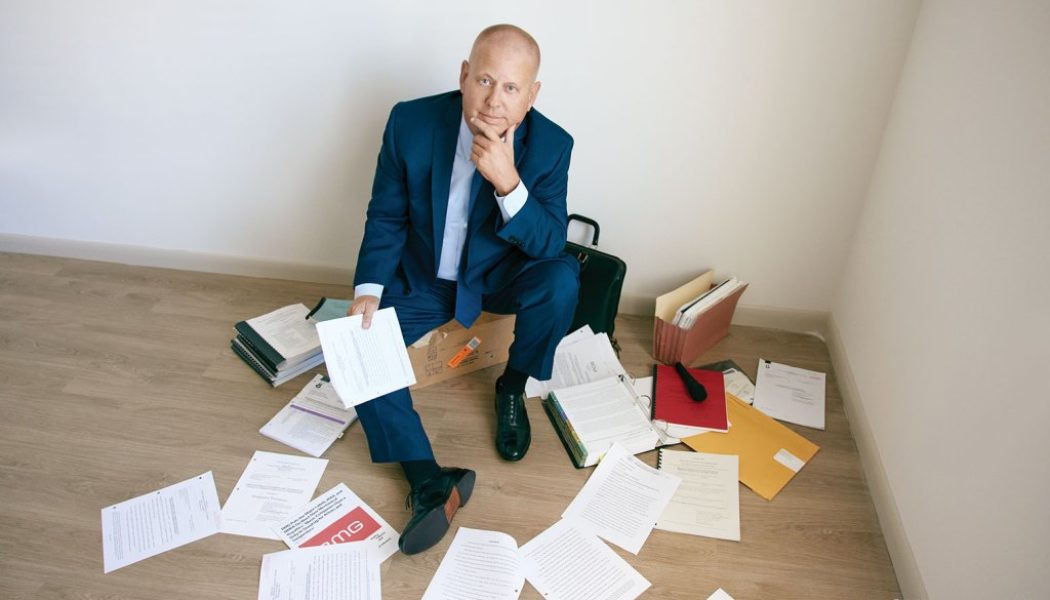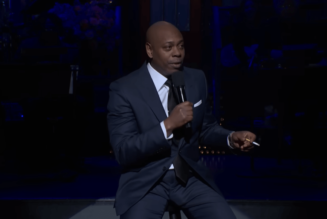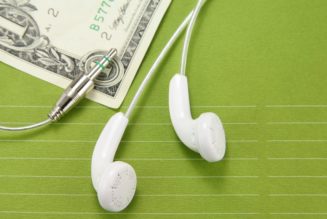It was a sweltering day in Washington, D.C., and George Johnson was running late for an appointment at the James Madison Memorial Building, the massive, bright-white marble box that is part of the Library of Congress. Inside, a high-priced lawyer for Pandora, impatient to move on with a 2016 hearing to set royalty rates for webcasting recorded music, suggested that the three-judge Copyright Royalty Board (CRB) simply call the next expert witness. But the judges decided to wait just a little longer.
Finally, an hour after his scheduled time, Johnson, now 55, burst into the room, drenched in sweat and wearing a “Still Pissed at Yoko” T-shirt. (He was out of suits, and his Metro had stalled.) “It looked like he’d just run a marathon,” remembers Chris Harrison, then vp of business affairs for Pandora and SiriusXM. “But he got his hour in front of the judges.”
As a songwriter, Johnson’s most popular track is the one advertised on his T-shirt, a whimsical rant against Ono for her alleged role in breaking up The Beatles. Its 2013 video — a psychedelic, jump-cutting homage to “Strawberry Fields Forever” starring birds, octopuses, fast-growing trees and Johnson dressed in various Sgt. Pepper’s Lonely Hearts Club Band costumes — has 9,250 plays on YouTube. But in the music business, he’s much better known — and occasionally feared — for his other job, which pays even less: filing legal motions in various CRB rate-setting proceedings. For the past 10 years, he has led a largely under-the-radar David vs. Goliath battle against the industry’s biggest labels, publishers and streaming services, facing off against top copyright lawyers who are paid to understand the arcane language of mechanical rights and late-fee waivers. He usually wears a suit in court.
[embedded content]
Johnson might be best understood as the music business equivalent of those earnest long-shot candidates who run for president with a big idea but face long odds — not quite as sophisticated as Ralph Nader but far more serious than Deez Nutz. He has no legal background, and he spends long, solitary days in his bare Florida apartment writing motions and preparing testimony, which is always smart but often over the top. And while he has no more chance of winning the debate over music royalties than Nader did of moving into the White House, he has learned enough about CRB proceedings (sometimes with help from staffers) to score at least one big win.
On March 24, in its first decision in the rate-setting procedure known as Phonorecords IV — the less important section sets mechanical royalty rates for physical music sales and downloads, while the crucial section sets such royalties for streaming services — the CRB agreed with one of Johnson’s long-running arguments. The board ruled that mechanical royalties for sales and downloads should not be frozen at 9.1 cents per song, as they have been since 2008. This development shocked publishing companies, which had provided the CRB with a carefully constructed settlement with record labels. In the ruling, interim chief copyright royalty judge Suzanne M. Barnett quoted at length from Johnson’s 27 filings before concluding that “the proposed settlement does not provide a reasonable basis for setting statutory rates and terms.”
Although the other pending part of Phonorecords IV, which deals with streaming, is far more significant to the industry, Johnson says, “I definitely feel validated.” That feeling was short-lived, however. In early May, the record labels and publishers boosted their settlement offer from 9.1 cents to a modestly increased 12 cents per song for each sale, prompting Johnson to revert to his standard outrage. (Why 12 cents? As several songwriter advocates argued to the CRB, it’s roughly the same as the recent growth of the Consumer Price Index.) His “central and No. 1 issue,” he says, is for that rate to rise to 50 cents per song, adjusted for “long-overdue inflation.” In a 40-page motion, he declared himself “continually tricked by these disingenuous lobbyists” for labels and publishers who “only offered the bare minimum 12 cents because they were forced to.”
Especially by regulatory-hearing standards, Johnson is outspoken, bombastic and profane. For him, though, this isn’t a fight over a few cents per song — it’s a moral struggle against the labels and publishers using the CRB process to agree on rates that are unfair to songwriters. In a motion filed with the CRB in 2021, Johnson attacked statements by the National Music Publishers’ Association and the RIAA as “EVIDENCE OF COUNSELS’ BLATANT LYING AND FRAUD.” In another motion last year — this one sprawling, passionate and full of boldface, italics and underlines — he frequently repeated his point that RIAA and NMPA lawyers said he wished to maintain royalty rates when, in fact, he demanded to raise them. He used the words “fraud” and “fraudulent” 18 times. In a phone interview, he calculates the mechanical per-stream rate from Spotify and other services, as set by the CRB, to be “.000-go-screw-yourselves.”
***
Johnson has been fighting for underdog causes for years, long before he ever heard of the CRB. His father, Darwin Johnson, is a retired attorney who owns a shipping company, Vance River Terminal, in Morgantown, W.Va. In 1999, the younger Johnson started attacking former West Virginia Gov. Cecil Underwood for unfairly jacking up the price of some land parcels Underwood personally owned; the U.S. Army Corps of Engineers said it was the best dock site for an inland port in the area. Johnson’s family had dock sites in the same area, and Underwood received approval from the state’s port authority to sell his land parcels for $216,000 — and possibly qualify for millions more in federal funds. Johnson told local reporters repeatedly the Underwood deal was a conflict of interest. He put out a protest song: “Cecil.”
Six years later, Johnson ran for U.S. Senate as a Republican, facing off against Robert Byrd; Johnson regularly pointed out that he had been a member of the Ku Klux Klan. (Byrd renounced his involvement in the Klan and went on to become the Senate’s longest-serving member, a Democrat who served as majority leader in the late 1970s.) Johnson resoundingly lost that election, then smaller races, then left politics for good. “It’s just a mind-boggling process,” says the self-described “center-right libertarian.” “But not as mind-boggling as the CRB.”
Since Johnson began his crusade as an unknown songwriter hanging around CRB meetings, his ideas have bubbled up — not quite to the mainstream, but close enough to have some influence.
In addition to the 50-cent per-song royalty and an old-school, iTunes-style Buy button that he believes should appear next to every Spotify or Apple Music track in order to encourage streaming subscribers to purchase downloads as well, Johnson’s broader ideas include a harsh critique of the entire structure of the recorded-music business. Labels, he argues, unfairly take advantage of a “willing buyer/willing seller” clause in the 2018 Music Modernization Act, in which Universal Music Group, Sony Music Entertainment and Warner Music Group and their publishing divisions are “simply negotiating with themselves” to keep songwriters’ rates low. He calls this “Soviet-style central planning and price-fixing.”
“All the people who are supposed to care about us and running around telling us how much they love songwriters, they’re out there saying, ‘We want to help you guys,’ but they’re trying to hurt you,” he says.
Until March, his crusade had been almost overwhelmingly unsuccessful. In July 2021, for example, the judges denied three of Johnson’s motions in a succinct, single page, responding: “None of the documents are proper motions.” But once the CRB raised the mechanical royalty rate for physical sales from 9.1 cents to 12 cents on March 24, the big players in the music business finally started to take him seriously. “The entire songwriter community owes a huge debt of thanks to those who fought for this increase in the face of the opposition of major record companies and indifference of major publishers,” BMG Rights Management declared in a statement.
Publishers know that Johnson’s win in Phonorecords IV is a tiny skirmish in a far larger battle, however. That part of the proceeding covered only physical sales and downloads, which the NMPA predicts will account for about 1.5% of the songwriting royalties set by the CRB for the 2023-2027 period that is the subject of the current proceeding. (Billboard estimates that these mechanical royalties accounted for 9% of that revenue in 2021.) The far more important part of Phonorecords IV involves the songwriting-side royalties for streaming that Spotify and other streaming services pay publishers and collecting societies. Johnson understands the stakes. “I’m going to give them hell,” he says of labels, publishers and streaming services. “Because they’re giving us hell and [have been] stealing from us for years. I’m treating them exactly the same way, with the same disrespect.”
Behind the scenes, sources tell Billboard, the major publishers and their attorneys worry that Johnson will meddle with their carefully planned strategy to maximize streaming payouts. “This is not Mr. Smith Goes to Washington,” says a music-publishing source. “The streaming market for this next five-year period is going to be worth billions and billions of dollars. There is so much at stake.”
The source, who also advocates for higher royalties, derides Johnson as a time-wasting provocateur: “His participation in the CRB hurts songwriters. Serious people trying to make serious gains for songwriters are hampered because they have to share time with him to make ridiculous arguments that the court immediately dismisses.”
Todd Larson, an attorney who has represented SiriusXM and Pandora at earlier CRB webcasting hearings, which made him a Johnson adversary, is slightly more diplomatic: “I like George a lot. He argues his position with conviction, and it’s admirable. But he’s sort of tilting at windmills.”
Johnson may be charging at imaginary enemies Don Quixote-style, but he is gradually gaining real allies. Over the last two or three years, instead of shunning Johnson as a fringe character, songwriters and attorneys have begun paying attention to his filings. First came David Lowery, frontman for Cracker and Camper Van Beethoven. A longtime critic of music streaming, he blogged in early 2020 about how right Johnson was and, in an interview with Billboard, praised him for “dragging the truth out into the light.”

Johnson’s ideas went mainstream, more or less, that year when Austin attorney Gwen Seale, who represents local songwriters, was researching the rate-setting system and came across his Phonorecords IV motions. Seale is well-connected: In 2020, she participated in a webinar with U.S. Rep. Lloyd Doggett, D-Texas, about unemployment programs, where she mentioned that songwriters are stuck with low mechanical royalty rates. After this exchange, Doggett sent a pointed letter last July to the Librarian of Congress and the Register of Copyrights. The participants in the CRB’s recent rate-setting hearings “are dominated by major publishers and record companies,” Doggett wrote, “seeking to impose their private settlement on all other songwriters.”
Those are George Johnson’s exact views.
A few weeks after Doggett’s letter, singer-songwriter Rosanne Cash wrote her own missive to the CRB, arguing that the royalty rate must be raised to account for inflation: “I don’t want to see an entire population give up their passion and their chosen vocation because they can’t pay the rent,” Cash wrote.
Johnson couldn’t have put it better himself. Except that he has, in hundreds of pages of motions that started as a sort of poetic rage but have gradually become a bit more succinct and polished as he received feedback from CRB clerks and learned the legal lingo.
“I realized George was arguing the pure songwriter position — truly protecting our interests,” Lowery says. “Some people might see him [as] throwing a wrench into the works, but he’s helping make the process more transparent and not letting those who represent publishers and big writers give away too much for songwriters.”
Christian Castle, an Austin music attorney who often criticized publishers, adds that Johnson has been a sort of unofficial advocate for the silent majority. “No one’s going to have the money to go up against every lawyer in the known universe. You have to go to Washington. You have to be there,” he says. “If George weren’t there, nobody would be there.” And while Doggett and Cash influenced the CRB’s ruling that led to the royalty increase, Johnson “definitely helped keep the issue alive,” Castle says.
The system for determining mechanical royalties is complicated: It allows groups like the RIAA and NMPA to send lawyers to Capitol Hill, haggle with Spotify and other streaming services, and set rates that help determine artists and songwriters’ livelihoods — like that soon-to-be-12-cents-per-song royalty paid on every record album or CD sale.
And it’s not exactly accessible. Many songwriters, even the most successful, have no idea where to begin when it comes to representing themselves at the hearings so crucial to their livelihoods. Who has time to learn copyright law, figure out how to file motions and show up for hours of hearings every day in D.C.? Only George Johnson. That leaves groups like the NMPA to essentially stick up for songwriters, even though their interests don’t exactly align with publishers. “They call themselves ‘the copyright owners,’ ” Johnson says. “Are you kidding me? You don’t own one copyright. You’re lobbyists. They don’t represent me.”
Johnson’s views on publishing and royalties can be, to put it generously, outside the mainstream. He favors completely eliminating the compulsory license that allows songwriters to receive those 12-cent royalties on physical sales whenever anyone covers their work. This is a major source of income for them, especially now, when stars like Bob Dylan and Stevie Nicks are selling their catalogs for hundreds of millions of dollars. But Johnson, a centrist Republican, is a free-market guy. Why shouldn’t songwriters and publishers be able to charge 10.1 cents a song when someone covers it? Or $100? “There’s nothing more that the music industry needs,” he says.
It’s an idea rooted more in philosophy than reality. Without that compulsory license, any artist who wanted to record a version of “Sugar Mountain” would have to ask permission from Neil Young’s people — and Young could reject every request. In fact, many of these long-standing publishing rules that Johnson wants to burn down are rooted in practical policies intended to make life easier for songwriters. An example of his self-righteousness that doesn’t translate well to everyday record-business policy is his belief that labels are basically cartels that negotiate lower rates with the publishing divisions they own so industry fat cats get rich. He makes a logical point about a conflict of interest that others have made over the years, but there’s no evidence of this in the CRB proceedings, and publishers also have an incentive to raise royalties.
“In my heart of hearts, I don’t believe the NMPA and the National Songwriters Association are these evil companies who are in bed with the devil, who are the major labels, and they’re trying to get all these rate reductions,” says Chris Wares, assistant chair of the music business/management department at Berklee College of Music. “Yes, there is some conflict of interest, but I genuinely think they want what’s best for songwriters.”
With characteristic bombast, Johnson disagrees. In 2018, he recalls, NMPA president/CEO David Israelite pointed out that the initial mechanical royalty rate of 2 cents, adopted in 1909, would be about 50 cents today, “if adjusted for inflation.” When the CRB decided on the 12-cent rate earlier this year, he called it an “extremely positive result.” To Johnson, that makes Israelite a “lying hypocrite” — how else could he praise a rate that’s so out of line with what he knows songwriters deserve? (Israelite declined to respond and would not comment for this story.) But Israelite’s job is complicated: He needs to keep publishers united, negotiate compromises with labels and focus on the streaming portion of the Phonorecords IV proceeding that’s far more important for the future of the business.
***
Johnson’s unofficial, unpaid career as an amateur songwriter lobbyist began in roughly 2012, when he released two albums on his own “just for the fun of it.” They didn’t sell, and he started asking himself questions about the business: “If I’m going to waste another two years doing an album that costs $30,000, why don’t I figure out what’s going on with the royalties?” The question began to consume him, and he realized how “messed up” the system is.
He became so immersed in the details that he took it upon himself to meet with one of West Virginia’s senators, Jay Rockefeller, suggesting a songwriter bill to eliminate the compulsory license because he was so opposed to the government setting royalty rates for songwriters. The next year, he attended a Grammys on the Hill event in Washington and had an encounter that would change his life. He says a well-known music executive in the city had heard about his meeting with Rockefeller and approached him, screaming and cursing: “What the f–k do you think you’re doing, meeting with your representative, doing your own bill?” Johnson calls this the “inciting incident to spark what I’m doing.”
But the executive in question insists it never happened. Asked if anyone could confirm this story, Johnson comes up with two witnesses, both of whom say in phone interviews that they don’t remember. Told this, Johnson responds with profane, all-caps emails. “He doesn’t have a memory problem,” Johnson wrote of one of them. “He’s a D.C. lobbyist.”
His crusade continues. In an October statement to the CRB proposing a 65% increase in streaming rates, among other provisions, Johnson filed 28 pages of testimony, quoting Apple senior vp of services Eddy Cue, uber-manager Irving Azoff and a former assistant attorney general. Songwriters, he concluded, “have the right to decide how much their content should cost.” (This time, he used the word “fraudulent” only once.)
For all his fiery behavior — he once screamed at Billboard reporter Ed Christman for suggesting that his push for an old-fashioned iTunes-style Buy button on streaming services was “quixotic” — Johnson leads a modest life. Today, he temporarily lives in a still largely unfurnished apartment near Juno Beach, Fla., where he spends time with his elderly father. He implies he finances his more-or-less full-time job as a songwriter advocate through a bit of family money: “I’m from a family that has done some real estate and things like that.” He drove an Uber until the pandemic and is now looking for work and doing job interviews over Zoom.
The pandemic has made it easy to live outside of Washington and still be part of CRB proceedings that have been mostly virtual for two years. He’s single, with no kids, and used to play golf and other sports until songwriting royalties consumed his life; he’s still writing and shopping songs, including a CRB-inspired one called “The Cost of Living’s All I’m Living For.” Eventually, he plans to return to Nashville, probably near Music Row and what was once Sammy B’s restaurant, where Johnson met renowned songwriters such as Dewayne Blackwell and Harlan Howard. He has powerful friends in the city.
“George Johnson has been a breakfast buddy of mine at Noshville for 10 years, and he possesses a big heart for what is fair for songwriters and publishers. I respect him for sticking up for the underdog,” country star Vince Gill writes in an email. “But he always orders poached eggs, which leaves me puzzled a bit.”
Johnson responds — because of course George Johnson responds: “If it wasn’t for poached eggs, or egg yolks in general,” he wrote in an email, “not one motion or word would have been written.”
This story will appear in the July 30, 2022, issue of Billboard.
[flexi-common-toolbar] [flexi-form class=”flexi_form_style” title=”Submit to Flexi” name=”my_form” ajax=”true”][flexi-form-tag type=”post_title” class=”fl-input” title=”Title” value=”” required=”true”][flexi-form-tag type=”category” title=”Select category”][flexi-form-tag type=”tag” title=”Insert tag”][flexi-form-tag type=”article” class=”fl-textarea” title=”Description” ][flexi-form-tag type=”file” title=”Select file” required=”true”][flexi-form-tag type=”submit” name=”submit” value=”Submit Now”] [/flexi-form]










Tagged: Copyright Royalty Board, entertainment blog, FEATURES, Magazine, music, music blog